外研版中考英语总复习(中册)第三篇 语法考点焦聚 专题12 简单句、并列句和复合句
文档属性
| 名称 | 外研版中考英语总复习(中册)第三篇 语法考点焦聚 专题12 简单句、并列句和复合句 |
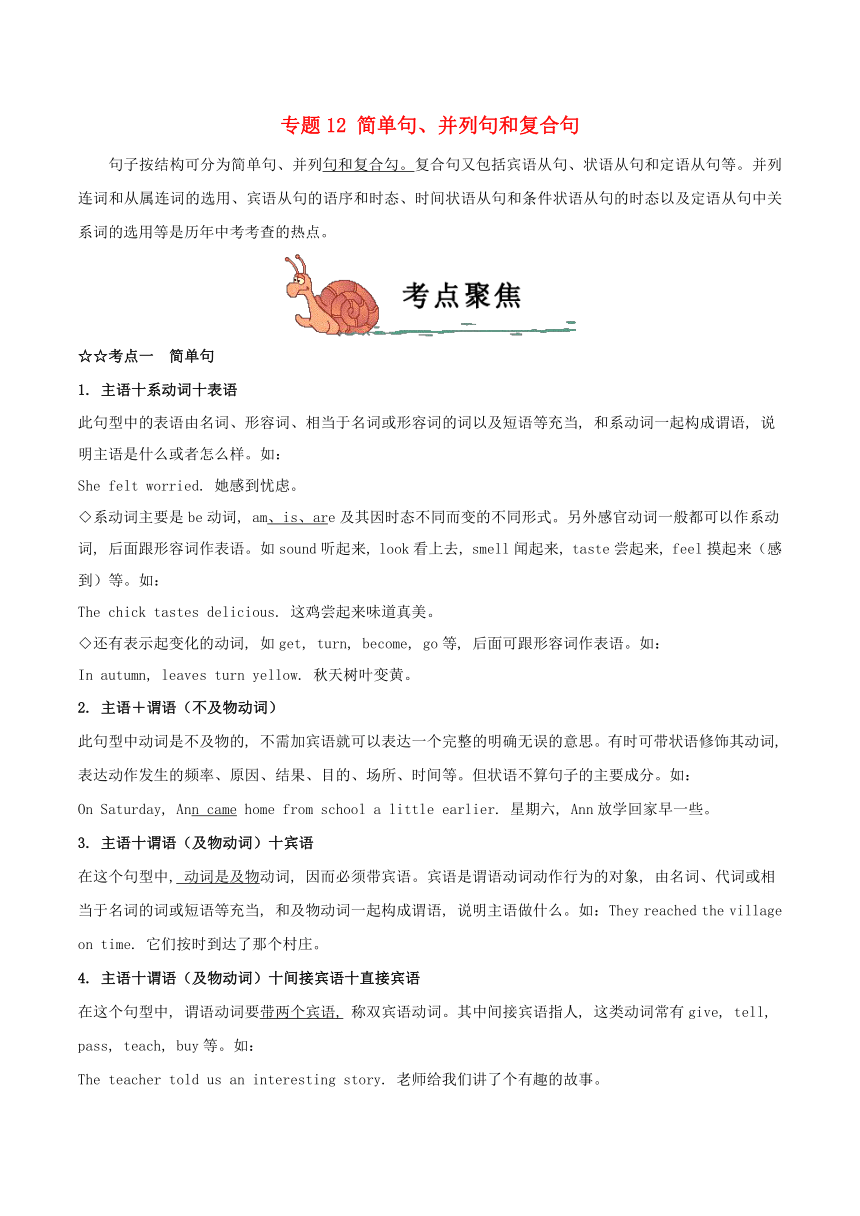
|
|
| 格式 | zip | ||
| 文件大小 | 33.2KB | ||
| 资源类型 | 教案 | ||
| 版本资源 | 外研版 | ||
| 科目 | 英语 | ||
| 更新时间 | 2016-08-25 21:46:01 | ||
图片预览

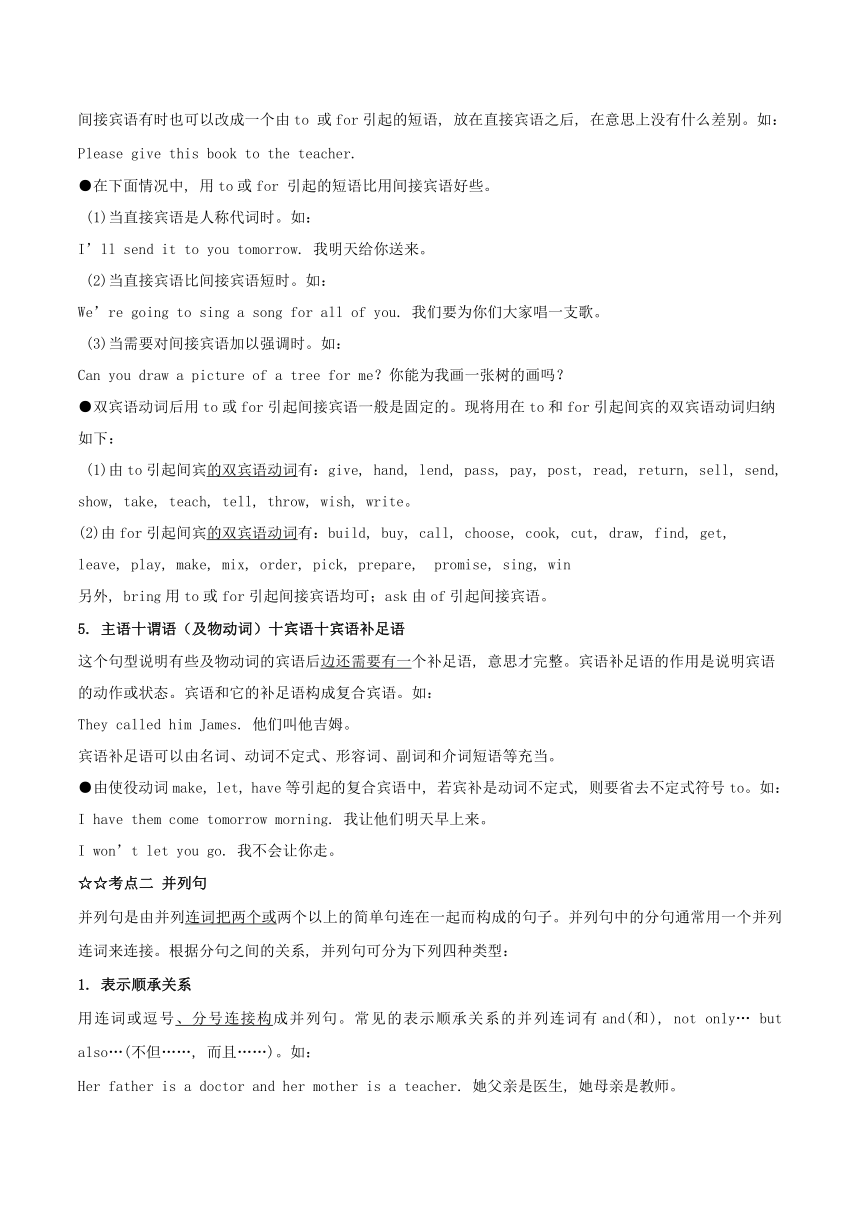
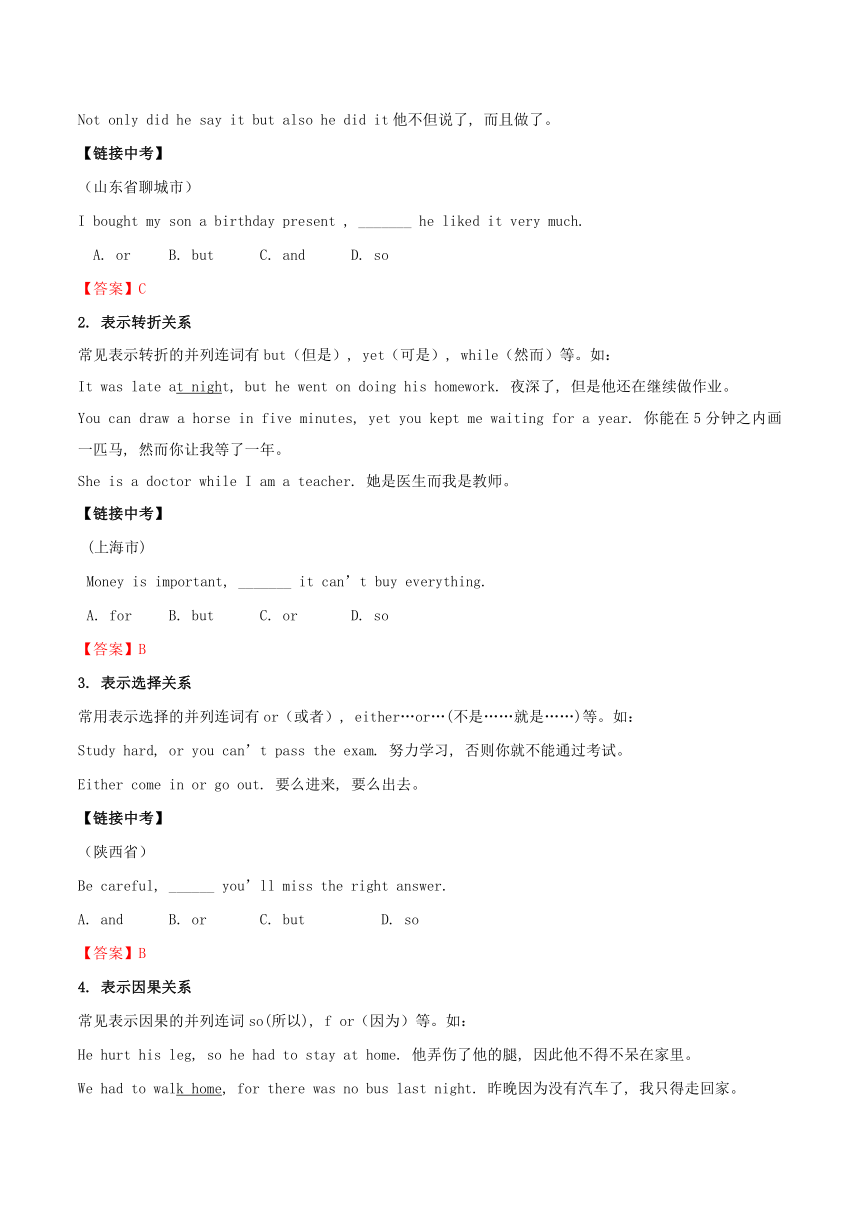
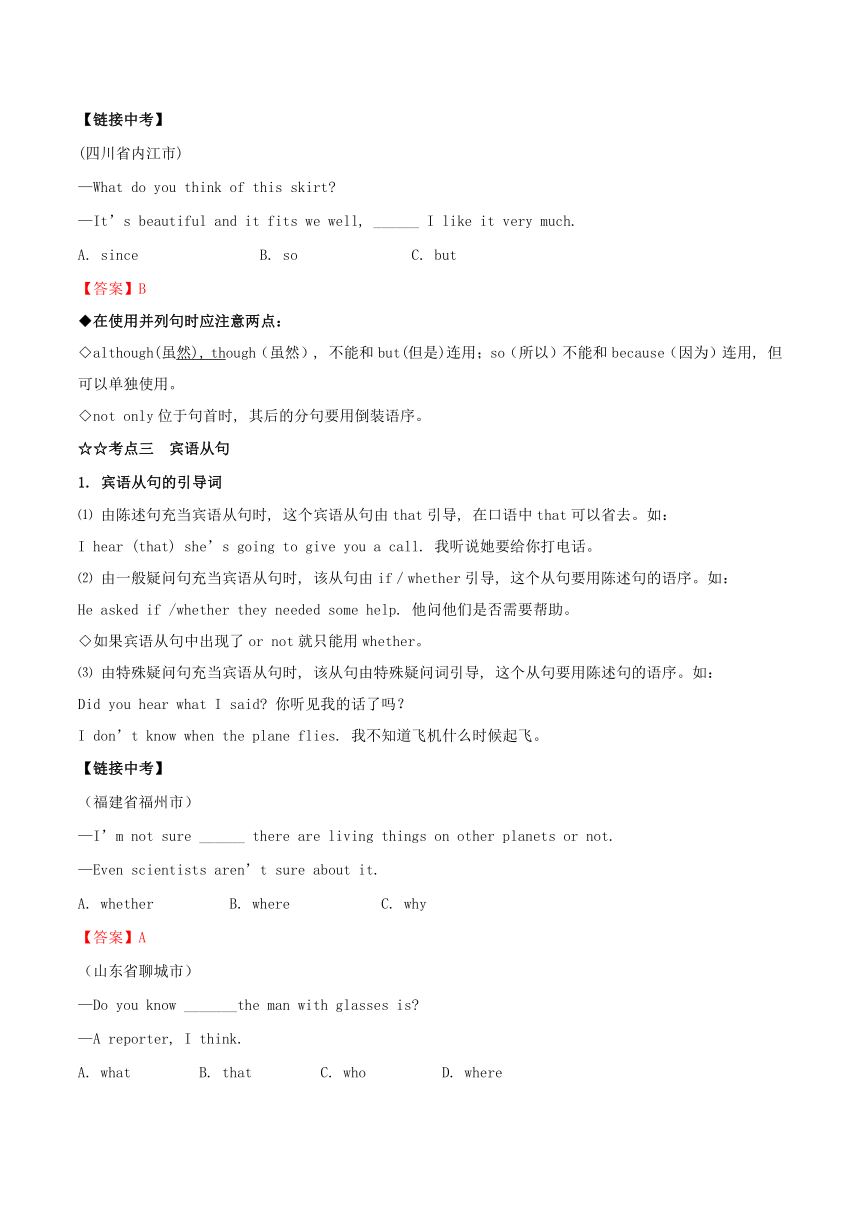
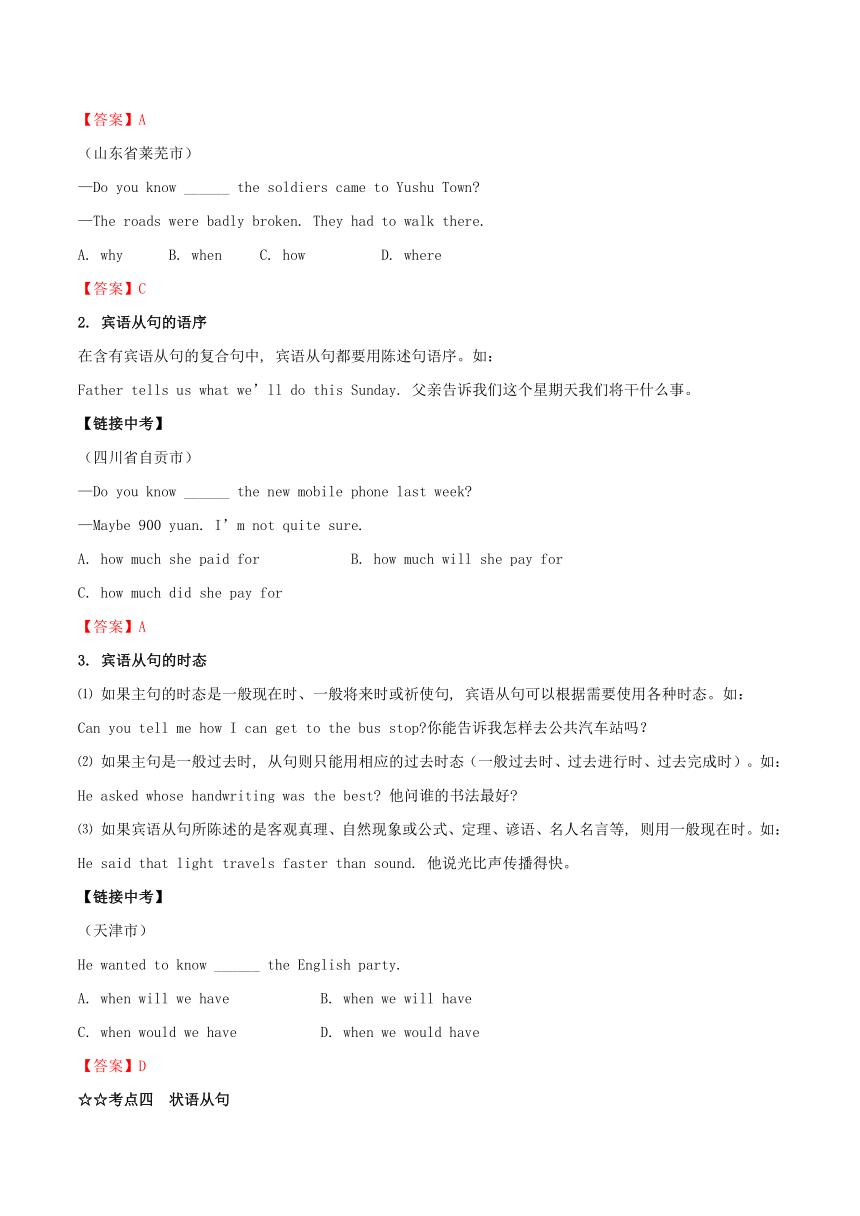
文档简介
专题12
简单句、并列句和复合句
句子按结构可分为简单句、并列句和复合勾。
( http: / / www.21cnjy.com )复合句又包括宾语从句、状语从句和定语从句等。并列连词和从属连词的选用、宾语从句的语序和时态、时间状语从句和条件状语从句的时态以及定语从句中关系词的选用等是历年中考考查的热点。
( http: / / www.21cnjy.com )
☆☆考点一
简单句
1.
主语十系动词十表语
此句型中的表语由名词、形容词、相当于名词或形容词的词以及短语等充当,
和系动词一起构成谓语,
说明主语是什么或者怎么样。如:
She
felt
worried.
她感到忧虑。
◇系动词主要是be动词,
am、is、ar
( http: / / www.21cnjy.com )e及其因时态不同而变的不同形式。另外感官动词一般都可以作系动词,
后面跟形容词作表语。如sound听起来,
look看上去,
smell闻起来,
taste尝起来,
feel摸起来(感到)等。如:
The
chick
tastes
delicious.
这鸡尝起来味道真美。
◇还有表示起变化的动词,
如get,
turn,
become,
go等,
后面可跟形容词作表语。如:
In
autumn,
leaves
turn
yellow.
秋天树叶变黄。
2.
主语+谓语(不及物动词)
此句型中动词是不及物的,
不需加宾语就可以表达一个完整的明确无误的意思。有时可带状语修饰其动词,
表达动作发生的频率、原因、结果、目的、场所、时间等。但状语不算句子的主要成分。如:
On
Saturday,
Ann
came
( http: / / www.21cnjy.com )
home
from
school
a
little
earlier.
星期六,
Ann放学回家早一些。
3.
主语十谓语(及物动词)十宾语
在这个句型中,
动词是及物
( http: / / www.21cnjy.com )动词,
因而必须带宾语。宾语是谓语动词动作行为的对象,
由名词、代词或相当于名词的词或短语等充当,
和及物动词一起构成谓语,
说明主语做什么。如:They
reached
the
village
on
time.
它们按时到达了那个村庄。
4.
主语十谓语(及物动词)十间接宾语十直接宾语
在这个句型中,
谓语动词要带两个宾语,
( http: / / www.21cnjy.com )
称双宾语动词。其中间接宾语指人,
这类动词常有give,
tell,
pass,
teach,
buy等。如:
The
teacher
told
us
an
interesting
story.
老师给我们讲了个有趣的故事。
间接宾语有时也可以改成一个由to
或for引起的短语,
放在直接宾语之后,
在意思上没有什么差别。如:
Please
give
this
book
to
the
teacher.
●在下面情况中,
用to或for
引起的短语比用间接宾语好些。
(1)当直接宾语是人称代词时。如:
I’ll
send
it
to
you
tomorrow.
我明天给你送来。
(2)当直接宾语比间接宾语短时。如:
We’re
going
to
sing
a
song
for
all
of
you.
我们要为你们大家唱一支歌。
(3)当需要对间接宾语加以强调时。如:
Can
you
draw
a
picture
of
a
tree
for
me?你能为我画一张树的画吗?
●双宾语动词后用to或for引起间接宾语一般是固定的。现将用在to和for引起间宾的双宾语动词归纳如下:
(1)由to引起间宾的双宾语动词
( http: / / www.21cnjy.com )有:give,
hand,
lend,
pass,
pay,
post,
read,
return,
sell,
send,
show,
take,
teach,
tell,
throw,
wish,
write。
(2)由for引起间宾的双宾语动词
( http: / / www.21cnjy.com )有:build,
buy,
call,
choose,
cook,
cut,
draw,
find,
get,
leave,
play,
make,
mix,
order,
pick,
prepare,
promise,
sing,
win
另外,
bring用to或for引起间接宾语均可;ask由of引起间接宾语。
5.
主语十谓语(及物动词)十宾语十宾语补足语
这个句型说明有些及物动词的宾语后边还需要有一
( http: / / www.21cnjy.com )个补足语,
意思才完整。宾语补足语的作用是说明宾语的动作或状态。宾语和它的补足语构成复合宾语。如:
They
called
him
James.
他们叫他吉姆。
宾语补足语可以由名词、动词不定式、形容词、副词和介词短语等充当。
●由使役动词make,
let,
have等引起的复合宾语中,
若宾补是动词不定式,
则要省去不定式符号to。如:
I
have
them
come
tomorrow
morning.
我让他们明天早上来。
I
won’t
let
you
go.
我不会让你走。
☆☆考点二
并列句
并列句是由并列连词把两个或
( http: / / www.21cnjy.com )两个以上的简单句连在一起而构成的句子。并列句中的分句通常用一个并列连词来连接。根据分句之间的关系,
并列句可分为下列四种类型:
1.
表示顺承关系
用连词或逗号、分号连接构
( http: / / www.21cnjy.com )成并列句。常见的表示顺承关系的并列连词有and(和),
not
only…
but
also…(不但……,
而且……)。如:
Her
father
is
a
doctor
and
her
mother
is
a
teacher.
她父亲是医生,
她母亲是教师。
Not
only
did
he
say
it
but
also
he
did
it他不但说了,
而且做了。
【链接中考】
(山东省聊城市)
I
bought
my
son
a
birthday
present
,
_______
he
liked
it
very
much.
A.
or
B.
but
C.
and
D.
so
【答案】C
2.
表示转折关系
常见表示转折的并列连词有but(但是),
yet(可是),
while(然而)等。如:
It
was
late
at
nigh
( http: / / www.21cnjy.com )t,
but
he
went
on
doing
his
homework.
夜深了,
但是他还在继续做作业。
You
can
draw
a
horse
in
five
minutes,
yet
you
kept
me
waiting
for
a
year.
你能在5分钟之内画一匹马,
然而你让我等了一年。
She
is
a
doctor
while
I
am
a
teacher.
她是医生而我是教师。
【链接中考】
(上海市)
Money
is
important,
_______
it
can’t
buy
everything.
A.
for
B.
but
C.
or
D.
so
【答案】B
3.
表示选择关系
常用表示选择的并列连词有or(或者),
either…or…(不是……就是……)等。如:
Study
hard,
or
you
can’t
pass
the
exam.
努力学习,
否则你就不能通过考试。
Either
come
in
or
go
out.
要么进来,
要么出去。
【链接中考】
(陕西省)
Be
careful,
______
you’ll
miss
the
right
answer.
A.
and
B.
or
C.
but
D.
so
【答案】B
4.
表示因果关系
常见表示因果的并列连词so(所以),
f
or(因为)等。如:
He
hurt
his
leg,
so
he
had
to
stay
at
home.
他弄伤了他的腿,
因此他不得不呆在家里。
We
had
to
walk
home
( http: / / www.21cnjy.com ),
for
there
was
no
bus
last
night.
昨晚因为没有汽车了,
我只得走回家。
【链接中考】
(四川省内江市)
—What
do
you
think
of
this
skirt
—It’s
beautiful
and
it
fits
we
well,
______
I
like
it
very
much.
A.
since
B.
so
C.
but
【答案】B
◆在使用并列句时应注意两点:
◇although(虽然),
th
( http: / / www.21cnjy.com )ough(虽然),
不能和but(但是)连用;so(所以)不能和because(因为)连用,
但可以单独使用。
◇not
only位于句首时,
其后的分句要用倒装语序。
☆☆考点三
宾语从句
1.
宾语从句的引导词
⑴
由陈述句充当宾语从句时,
这个宾语从句由that引导,
在口语中that可以省去。如:
I
hear
(that)
she’s
going
to
give
you
a
call.
我听说她要给你打电话。
⑵
由一般疑问句充当宾语从句时,
该从句由if/whether引导,
这个从句要用陈述句的语序。如:
He
asked
if
/whether
they
needed
some
help.
他问他们是否需要帮助。
◇如果宾语从句中出现了or
not就只能用whether。
⑶
由特殊疑问句充当宾语从句时,
该从句由特殊疑问词引导,
这个从句要用陈述句的语序。如:
Did
you
hear
what
I
said
你听见我的话了吗?
I
don’t
know
when
the
plane
flies.
我不知道飞机什么时候起飞。
【链接中考】
(福建省福州市)
—I’m
not
sure
______
there
are
living
things
on
other
planets
or
not.
—Even
scientists
aren’t
sure
about
it.
A.
whether
B.
where
C.
why
【答案】A
(山东省聊城市)
—Do
you
know
_______the
man
with
glasses
is
—A
reporter,
I
think.
A.
what
B.
that
C.
who
D.
where
【答案】A
(山东省莱芜市)
—Do
you
know
______
the
soldiers
came
to
Yushu
Town
—The
roads
were
badly
broken.
They
had
to
walk
there.
A.
why
B.
when
C.
how
D.
where
【答案】C
2.
宾语从句的语序
在含有宾语从句的复合句中,
宾语从句都要用陈述句语序。如:
Father
tells
us
what
we’ll
do
this
Sunday.
父亲告诉我们这个星期天我们将干什么事。
【链接中考】
(四川省自贡市)
—Do
you
know
______
the
new
mobile
phone
last
week
—Maybe
900
yuan.
I’m
not
quite
sure.
A.
how
much
she
paid
for
B.
how
much
will
she
pay
for
C.
how
much
did
she
pay
for
【答案】A
3.
宾语从句的时态
⑴
如果主句的时态是一般现在时、一般将来时或祈使句,
宾语从句可以根据需要使用各种时态。如:
Can
you
tell
me
how
I
can
get
to
the
bus
stop 你能告诉我怎样去公共汽车站吗?
⑵
如果主句是一般过去时,
从句则只能用相应的过去时态(一般过去时、过去进行时、过去完成时)。如:
He
asked
whose
handwriting
was
the
best
他问谁的书法最好
⑶
如果宾语从句所陈述的是客观真理、自然现象或公式、定理、谚语、名人名言等,
则用一般现在时。如:
He
said
that
light
travels
faster
than
sound.
他说光比声传播得快。
【链接中考】
(天津市)
He
wanted
to
know
______
the
English
party.
A.
when
will
we
have
B.
when
we
will
have
C.
when
would
we
have
D.
when
we
would
have
【答案】D
☆☆考点四
状语从句
1.
时间状语从句
时间状语从句常用的引导词有:when(当……时),
while(当……时),
as(当……时),
before(在……以前),
after(在……以后),
since(自……以来),
until(直到……),
as
soon
as(一……就)。如:
She
will
give
the
book
to
her
when
she
comes.
她到来时,
我将把这本书给她。
While
Mother
was
cooking,
Father
was
watching
TV.
当妈妈做饭时,
爸爸在看电视。
●在时间状语从句中,
如果主句的谓语动词是一般将来时,
从句中的谓语动词要用一般现在时表示将来。如:
he
will
tell
you
the
news
as
soon
as
she
sees
you.
她一见到你就会把这消息告诉你。
【链接中考】
(河北省卷)
Peter
likes
reading
a
newspaper
______
he
is
having
breakfast.
A.
until
B.
while
C.
because
D.
though
【答案】B
(江苏省无锡市)
Scientists
say
it
( http: / / www.21cnjy.com )may
be
a
few
years
______
it
is
possible
to
test
the
new
medicine
on
patients.
A.
because
B.
after
C.
before
D.
since
【答案】C
2.
条件状语从句
条件状语从句常由if,
unless等引导。如:
He’ll
go
to
the
cinema
with
me
if
it
is
free.
如果他有空,
今天下午就和我一起看电影。
I
won’t
go
to
the
party
unless
I’m
invited.
除非我被邀请,
否则我不会去参加晚会的。
●在条件状语从句中,
如果主句的谓语动词是一般将来时,
从句的谓语动词常用一般现在时表示将来。
If
I
am
free,
I
will
go
to
see
you.
如果我有空,
我就去看你。
【链接中考】
(年上海市)We
will
have
( http: / / www.21cnjy.com )no
water
to
drink
______
we
don’t
protect
the
earth.
A.
until
B.
before
C.
though
D.
if
【答案】D
(江苏省扬州市)
—Could
we
play
football
in
your
playground,
Sir
—No,
______
you
have
the
principal’s
note.
A.
if
B.
unless
C.
because
D.
since
【答案】B
3.
原因状语从句
原因状语从句可以由as,
be
( http: / / www.21cnjy.com )cause,
since,
for等引导。在引导原因状语从句时,
because语气最强,
其次是as和since。
Since
you’re
not
in
( http: / / www.21cnjy.com )terested,
I
won’t
tell
you
about
it.
既然你不感兴趣,
那我就不告诉你了
He
didn’t
go
to
school
because
he
was
ill.
他因为生病没去上学。
●在原因状语从句中,
because和so不能在一个句子中同时出现。
【链接中考】
(四川省成都市)
I
won’t
be
able
to
un
( http: / / www.21cnjy.com )derstand
what
you
say,
______
you
speak
too
quickly.
A.
if
B.
though
C.
because
【答案】C
4.
结果状语从句
结果状语从句主要由so…that与such…that引导。
She
is
so
beautiful
that
many
people
like
her.
她太漂亮了以致很多人喜欢她。
It
was
such
a
( http: / / www.21cnjy.com )fine
day
that
nobody
wanted
to
stay
at
home.
天气这么好,
没有人愿意呆在家里不出去。
◇“so…that…”和“such…that…”两种句型可以互相转换,
以使语言变得更加丰富多彩。
He
is
so
young
that
he
can’t
go
to
school.
→He
is
such
a
young
boy
that
he
can’t
go
to
school.
◇so…that与such…that的肯定形式可用enough
to改写,
其否定形式则由too…to改写。
English
is
so
useful
that
we
must
learn
it
well.
→English
is
useful
enough
for
us
to
learn
it
well.
I’m
so
tired
that
I
can’t
go
any
farther.
→I’m
too
tired
to
go
any
farther.
【链接中考】
(青海省,
宁夏)
—Did
you
catch
what
the
teacher
said
—No.
She
spoke
so
fast
______
I
couldn’t
hear
her
very
clearly.
A.
which
B.
that
C.
when
D.
since
【答案】B
5.
目的状语从句
目的状语从句由表示“为了,
以便”的so
that(有时省略so),
in
order
that等引导。如:
They
set
out
early
so
that
they
might
arrive
in
time.
他们早点动身,
以便及时到达。
He
shouted
at
the
t
( http: / / www.21cnjy.com )op
of
his
voice
in
order
that
he
might
be
heard.
他尽力大声叫喊,
以便别人能听见。
◇如果表示“为了,
以便”的目的状语从句的主语与主句的主语相同,
可用in
order
to或
so
as
to取代该目的状语从句。
He
hurried
through
his
work
in
order
to
catch
the
train.
他匆匆干完手中的活,
为的是能赶上火车。
I
came
so
early
as
to
catch
the
first
train.
我起得早,
以便能赶上头班火车。
【链接中考】
(广东省)
The
teacher
speaks
( http: / / www.21cnjy.com )very
loudly
all
the
students
can
hear
her.
A.
so
that
B.
because
C.
since
D.
when
【答案】A
6.
让步状语从句
让步状语从句常由连词though,
al
( http: / / www.21cnjy.com )though,
even
if/though引导。用了though就不用but,
和because,
so一样不得同时出现。
Though
he
has
never
be
( http: / / www.21cnjy.com )en
to
the
USA,
he
is
interested
in
it.
虽然他没去过美国,
但他对它很赶兴趣。
【链接中考】
(河南省)
it’s
diffi
( http: / / www.21cnjy.com )cult
to
make
her
dream
come
true,
she
never
gives
up
A
Though
B
Unless
C
Because
D
If
【答案】A
7.
比较状语从句
比较状语从句常由than,
as…as,
not
as/
so…as引导。如:
Mary
is
more
beautiful
than
Joan.
玛丽比琼漂亮。
Joan
doesn’t
sing
so
(as)
well
as
Mary.
琼没有玛丽唱得好。
【链接中考】
(广东省)
—Why
don’t
you
like
winter
in
Beijing
—Because
it
is
winter
in
Guangzhou.
A.
as
cold
as
B.
much
colder
than
C.
not
so
cold
as
D.
not
colder
than
【答案】B
☆☆考点五
定语从句
在复合句中,
修饰某一名词或代词,
或修饰整个主句的从句叫做定语从句。被定语从句修饰的名词或代词叫做先行词。引导定语从句的关联词有关系代词who,
whom,
whose,
which,
that和关系副词when,
where,
why。关系代词和关系副词既联系定语从句和它的先行词,
同时又充当定语从句中的一个成分。
1.
关系代词引导的定语从句
⑴
who指人,
在定语从句中做主语。如:
The
man
who
is
talki
( http: / / www.21cnjy.com )ng
to
our
teacher
is
Mike’s
father.
和我们老师谈话的那个人是迈克的父亲。
⑵
whom指人(在口语中可用who代替),
在定语从句中做宾语。如:
The
man
(whom)
you
helped
is
my
neighbor.
你帮助过的那个人是我的邻居。
注意:当关系代词在定语从句中做宾语时,
关系代词可省略。
⑶
whose指人,
在定语从句中做定语。如:
What
is
the
name
( http: / / www.21cnjy.com )of
the
boy
whose
brother
is
a
doctor.
他哥哥是医生的那个孩子叫什么?
⑷
which指物,
在定语从句中做主语和宾语
(做宾语时,
可省略)
。如:
This
is
a
book
(which)
I
bought
yesterday.
这就是我昨天买的那本书。(做宾语)
⑸
that指物或人,
在定语从句中做主语或宾语。如:
Who
is
the
person
( http: / / www.21cnjy.com )that
is
working
at
a
computer
over
there
在计算机上工作的那人是谁?(做主语,
指人)
【链接中考】
(河北省卷)
There
are
lots
of
things
I
need
to
prepare
before
the
trip.
A.
who
B.
that
C.
whom
D.
whose
【答案】B
(四川省自贡市)
Jim
dislikes
people
______talk
much
but
never
do
anything.
A.
who
B.
whom
C.
whose
【答案】A
(广西省桂林市)
This
is
my
beautiful
school
_______
is
near
the
famous
library.
A.
where
B.
which
C.
who
D.
when
【答案】B
(湖北省荆门市)
The
girl
_______
you
talked
with
at
the
school
gate
is
our
new
math
teacher.
A.
whose
B.
which
C.
whom
D.
what
【答案】C
2.
关系副词引导的定语从句
⑴
when引导的定语从句修饰表示时间的day,
year等先行词。如:
I
still
rememb
( http: / / www.21cnjy.com )er
the
day
when
I
first
came
to
Beijing.
我仍然记得我第一次来北京的那一天。
⑵
where引导的定语从句修饰表示地点的the
place,
the
city等先行词。如:
This
is
the
city
where
I
was
born.
这就是我出生的城市。
⑶
why引导的定语从句修饰先行词reason。如:
Do
you
know
the
reason
why
it
is
so
hot
this
summer 你知道今年夏天这么热的原因吗?
【链接中考】
(湖北省十堰市)
I
began
to
wo
( http: / / www.21cnjy.com )rk
in
Shanghai
in
the
year
______
Hong
Kong
was
returned
to
China.
A.
that
B.
which
C.
where
D.
when
【答案】D
(黑龙江省哈尔滨市)
—What
do
you
usually
do
in
your
leisure
time
—I
enjoy
reading
in
t
( http: / / www.21cnjy.com )he
library
______
I
lose
myself
in
a
world
of
good
books.
A.
which
B.
that
C.
where
【答案】C
简单句、并列句和复合句
句子按结构可分为简单句、并列句和复合勾。
( http: / / www.21cnjy.com )复合句又包括宾语从句、状语从句和定语从句等。并列连词和从属连词的选用、宾语从句的语序和时态、时间状语从句和条件状语从句的时态以及定语从句中关系词的选用等是历年中考考查的热点。
( http: / / www.21cnjy.com )
☆☆考点一
简单句
1.
主语十系动词十表语
此句型中的表语由名词、形容词、相当于名词或形容词的词以及短语等充当,
和系动词一起构成谓语,
说明主语是什么或者怎么样。如:
She
felt
worried.
她感到忧虑。
◇系动词主要是be动词,
am、is、ar
( http: / / www.21cnjy.com )e及其因时态不同而变的不同形式。另外感官动词一般都可以作系动词,
后面跟形容词作表语。如sound听起来,
look看上去,
smell闻起来,
taste尝起来,
feel摸起来(感到)等。如:
The
chick
tastes
delicious.
这鸡尝起来味道真美。
◇还有表示起变化的动词,
如get,
turn,
become,
go等,
后面可跟形容词作表语。如:
In
autumn,
leaves
turn
yellow.
秋天树叶变黄。
2.
主语+谓语(不及物动词)
此句型中动词是不及物的,
不需加宾语就可以表达一个完整的明确无误的意思。有时可带状语修饰其动词,
表达动作发生的频率、原因、结果、目的、场所、时间等。但状语不算句子的主要成分。如:
On
Saturday,
Ann
came
( http: / / www.21cnjy.com )
home
from
school
a
little
earlier.
星期六,
Ann放学回家早一些。
3.
主语十谓语(及物动词)十宾语
在这个句型中,
动词是及物
( http: / / www.21cnjy.com )动词,
因而必须带宾语。宾语是谓语动词动作行为的对象,
由名词、代词或相当于名词的词或短语等充当,
和及物动词一起构成谓语,
说明主语做什么。如:They
reached
the
village
on
time.
它们按时到达了那个村庄。
4.
主语十谓语(及物动词)十间接宾语十直接宾语
在这个句型中,
谓语动词要带两个宾语,
( http: / / www.21cnjy.com )
称双宾语动词。其中间接宾语指人,
这类动词常有give,
tell,
pass,
teach,
buy等。如:
The
teacher
told
us
an
interesting
story.
老师给我们讲了个有趣的故事。
间接宾语有时也可以改成一个由to
或for引起的短语,
放在直接宾语之后,
在意思上没有什么差别。如:
Please
give
this
book
to
the
teacher.
●在下面情况中,
用to或for
引起的短语比用间接宾语好些。
(1)当直接宾语是人称代词时。如:
I’ll
send
it
to
you
tomorrow.
我明天给你送来。
(2)当直接宾语比间接宾语短时。如:
We’re
going
to
sing
a
song
for
all
of
you.
我们要为你们大家唱一支歌。
(3)当需要对间接宾语加以强调时。如:
Can
you
draw
a
picture
of
a
tree
for
me?你能为我画一张树的画吗?
●双宾语动词后用to或for引起间接宾语一般是固定的。现将用在to和for引起间宾的双宾语动词归纳如下:
(1)由to引起间宾的双宾语动词
( http: / / www.21cnjy.com )有:give,
hand,
lend,
pass,
pay,
post,
read,
return,
sell,
send,
show,
take,
teach,
tell,
throw,
wish,
write。
(2)由for引起间宾的双宾语动词
( http: / / www.21cnjy.com )有:build,
buy,
call,
choose,
cook,
cut,
draw,
find,
get,
leave,
play,
make,
mix,
order,
pick,
prepare,
promise,
sing,
win
另外,
bring用to或for引起间接宾语均可;ask由of引起间接宾语。
5.
主语十谓语(及物动词)十宾语十宾语补足语
这个句型说明有些及物动词的宾语后边还需要有一
( http: / / www.21cnjy.com )个补足语,
意思才完整。宾语补足语的作用是说明宾语的动作或状态。宾语和它的补足语构成复合宾语。如:
They
called
him
James.
他们叫他吉姆。
宾语补足语可以由名词、动词不定式、形容词、副词和介词短语等充当。
●由使役动词make,
let,
have等引起的复合宾语中,
若宾补是动词不定式,
则要省去不定式符号to。如:
I
have
them
come
tomorrow
morning.
我让他们明天早上来。
I
won’t
let
you
go.
我不会让你走。
☆☆考点二
并列句
并列句是由并列连词把两个或
( http: / / www.21cnjy.com )两个以上的简单句连在一起而构成的句子。并列句中的分句通常用一个并列连词来连接。根据分句之间的关系,
并列句可分为下列四种类型:
1.
表示顺承关系
用连词或逗号、分号连接构
( http: / / www.21cnjy.com )成并列句。常见的表示顺承关系的并列连词有and(和),
not
only…
but
also…(不但……,
而且……)。如:
Her
father
is
a
doctor
and
her
mother
is
a
teacher.
她父亲是医生,
她母亲是教师。
Not
only
did
he
say
it
but
also
he
did
it他不但说了,
而且做了。
【链接中考】
(山东省聊城市)
I
bought
my
son
a
birthday
present
,
_______
he
liked
it
very
much.
A.
or
B.
but
C.
and
D.
so
【答案】C
2.
表示转折关系
常见表示转折的并列连词有but(但是),
yet(可是),
while(然而)等。如:
It
was
late
at
nigh
( http: / / www.21cnjy.com )t,
but
he
went
on
doing
his
homework.
夜深了,
但是他还在继续做作业。
You
can
draw
a
horse
in
five
minutes,
yet
you
kept
me
waiting
for
a
year.
你能在5分钟之内画一匹马,
然而你让我等了一年。
She
is
a
doctor
while
I
am
a
teacher.
她是医生而我是教师。
【链接中考】
(上海市)
Money
is
important,
_______
it
can’t
buy
everything.
A.
for
B.
but
C.
or
D.
so
【答案】B
3.
表示选择关系
常用表示选择的并列连词有or(或者),
either…or…(不是……就是……)等。如:
Study
hard,
or
you
can’t
pass
the
exam.
努力学习,
否则你就不能通过考试。
Either
come
in
or
go
out.
要么进来,
要么出去。
【链接中考】
(陕西省)
Be
careful,
______
you’ll
miss
the
right
answer.
A.
and
B.
or
C.
but
D.
so
【答案】B
4.
表示因果关系
常见表示因果的并列连词so(所以),
f
or(因为)等。如:
He
hurt
his
leg,
so
he
had
to
stay
at
home.
他弄伤了他的腿,
因此他不得不呆在家里。
We
had
to
walk
home
( http: / / www.21cnjy.com ),
for
there
was
no
bus
last
night.
昨晚因为没有汽车了,
我只得走回家。
【链接中考】
(四川省内江市)
—What
do
you
think
of
this
skirt
—It’s
beautiful
and
it
fits
we
well,
______
I
like
it
very
much.
A.
since
B.
so
C.
but
【答案】B
◆在使用并列句时应注意两点:
◇although(虽然),
th
( http: / / www.21cnjy.com )ough(虽然),
不能和but(但是)连用;so(所以)不能和because(因为)连用,
但可以单独使用。
◇not
only位于句首时,
其后的分句要用倒装语序。
☆☆考点三
宾语从句
1.
宾语从句的引导词
⑴
由陈述句充当宾语从句时,
这个宾语从句由that引导,
在口语中that可以省去。如:
I
hear
(that)
she’s
going
to
give
you
a
call.
我听说她要给你打电话。
⑵
由一般疑问句充当宾语从句时,
该从句由if/whether引导,
这个从句要用陈述句的语序。如:
He
asked
if
/whether
they
needed
some
help.
他问他们是否需要帮助。
◇如果宾语从句中出现了or
not就只能用whether。
⑶
由特殊疑问句充当宾语从句时,
该从句由特殊疑问词引导,
这个从句要用陈述句的语序。如:
Did
you
hear
what
I
said
你听见我的话了吗?
I
don’t
know
when
the
plane
flies.
我不知道飞机什么时候起飞。
【链接中考】
(福建省福州市)
—I’m
not
sure
______
there
are
living
things
on
other
planets
or
not.
—Even
scientists
aren’t
sure
about
it.
A.
whether
B.
where
C.
why
【答案】A
(山东省聊城市)
—Do
you
know
_______the
man
with
glasses
is
—A
reporter,
I
think.
A.
what
B.
that
C.
who
D.
where
【答案】A
(山东省莱芜市)
—Do
you
know
______
the
soldiers
came
to
Yushu
Town
—The
roads
were
badly
broken.
They
had
to
walk
there.
A.
why
B.
when
C.
how
D.
where
【答案】C
2.
宾语从句的语序
在含有宾语从句的复合句中,
宾语从句都要用陈述句语序。如:
Father
tells
us
what
we’ll
do
this
Sunday.
父亲告诉我们这个星期天我们将干什么事。
【链接中考】
(四川省自贡市)
—Do
you
know
______
the
new
mobile
phone
last
week
—Maybe
900
yuan.
I’m
not
quite
sure.
A.
how
much
she
paid
for
B.
how
much
will
she
pay
for
C.
how
much
did
she
pay
for
【答案】A
3.
宾语从句的时态
⑴
如果主句的时态是一般现在时、一般将来时或祈使句,
宾语从句可以根据需要使用各种时态。如:
Can
you
tell
me
how
I
can
get
to
the
bus
stop 你能告诉我怎样去公共汽车站吗?
⑵
如果主句是一般过去时,
从句则只能用相应的过去时态(一般过去时、过去进行时、过去完成时)。如:
He
asked
whose
handwriting
was
the
best
他问谁的书法最好
⑶
如果宾语从句所陈述的是客观真理、自然现象或公式、定理、谚语、名人名言等,
则用一般现在时。如:
He
said
that
light
travels
faster
than
sound.
他说光比声传播得快。
【链接中考】
(天津市)
He
wanted
to
know
______
the
English
party.
A.
when
will
we
have
B.
when
we
will
have
C.
when
would
we
have
D.
when
we
would
have
【答案】D
☆☆考点四
状语从句
1.
时间状语从句
时间状语从句常用的引导词有:when(当……时),
while(当……时),
as(当……时),
before(在……以前),
after(在……以后),
since(自……以来),
until(直到……),
as
soon
as(一……就)。如:
She
will
give
the
book
to
her
when
she
comes.
她到来时,
我将把这本书给她。
While
Mother
was
cooking,
Father
was
watching
TV.
当妈妈做饭时,
爸爸在看电视。
●在时间状语从句中,
如果主句的谓语动词是一般将来时,
从句中的谓语动词要用一般现在时表示将来。如:
he
will
tell
you
the
news
as
soon
as
she
sees
you.
她一见到你就会把这消息告诉你。
【链接中考】
(河北省卷)
Peter
likes
reading
a
newspaper
______
he
is
having
breakfast.
A.
until
B.
while
C.
because
D.
though
【答案】B
(江苏省无锡市)
Scientists
say
it
( http: / / www.21cnjy.com )may
be
a
few
years
______
it
is
possible
to
test
the
new
medicine
on
patients.
A.
because
B.
after
C.
before
D.
since
【答案】C
2.
条件状语从句
条件状语从句常由if,
unless等引导。如:
He’ll
go
to
the
cinema
with
me
if
it
is
free.
如果他有空,
今天下午就和我一起看电影。
I
won’t
go
to
the
party
unless
I’m
invited.
除非我被邀请,
否则我不会去参加晚会的。
●在条件状语从句中,
如果主句的谓语动词是一般将来时,
从句的谓语动词常用一般现在时表示将来。
If
I
am
free,
I
will
go
to
see
you.
如果我有空,
我就去看你。
【链接中考】
(年上海市)We
will
have
( http: / / www.21cnjy.com )no
water
to
drink
______
we
don’t
protect
the
earth.
A.
until
B.
before
C.
though
D.
if
【答案】D
(江苏省扬州市)
—Could
we
play
football
in
your
playground,
Sir
—No,
______
you
have
the
principal’s
note.
A.
if
B.
unless
C.
because
D.
since
【答案】B
3.
原因状语从句
原因状语从句可以由as,
be
( http: / / www.21cnjy.com )cause,
since,
for等引导。在引导原因状语从句时,
because语气最强,
其次是as和since。
Since
you’re
not
in
( http: / / www.21cnjy.com )terested,
I
won’t
tell
you
about
it.
既然你不感兴趣,
那我就不告诉你了
He
didn’t
go
to
school
because
he
was
ill.
他因为生病没去上学。
●在原因状语从句中,
because和so不能在一个句子中同时出现。
【链接中考】
(四川省成都市)
I
won’t
be
able
to
un
( http: / / www.21cnjy.com )derstand
what
you
say,
______
you
speak
too
quickly.
A.
if
B.
though
C.
because
【答案】C
4.
结果状语从句
结果状语从句主要由so…that与such…that引导。
She
is
so
beautiful
that
many
people
like
her.
她太漂亮了以致很多人喜欢她。
It
was
such
a
( http: / / www.21cnjy.com )fine
day
that
nobody
wanted
to
stay
at
home.
天气这么好,
没有人愿意呆在家里不出去。
◇“so…that…”和“such…that…”两种句型可以互相转换,
以使语言变得更加丰富多彩。
He
is
so
young
that
he
can’t
go
to
school.
→He
is
such
a
young
boy
that
he
can’t
go
to
school.
◇so…that与such…that的肯定形式可用enough
to改写,
其否定形式则由too…to改写。
English
is
so
useful
that
we
must
learn
it
well.
→English
is
useful
enough
for
us
to
learn
it
well.
I’m
so
tired
that
I
can’t
go
any
farther.
→I’m
too
tired
to
go
any
farther.
【链接中考】
(青海省,
宁夏)
—Did
you
catch
what
the
teacher
said
—No.
She
spoke
so
fast
______
I
couldn’t
hear
her
very
clearly.
A.
which
B.
that
C.
when
D.
since
【答案】B
5.
目的状语从句
目的状语从句由表示“为了,
以便”的so
that(有时省略so),
in
order
that等引导。如:
They
set
out
early
so
that
they
might
arrive
in
time.
他们早点动身,
以便及时到达。
He
shouted
at
the
t
( http: / / www.21cnjy.com )op
of
his
voice
in
order
that
he
might
be
heard.
他尽力大声叫喊,
以便别人能听见。
◇如果表示“为了,
以便”的目的状语从句的主语与主句的主语相同,
可用in
order
to或
so
as
to取代该目的状语从句。
He
hurried
through
his
work
in
order
to
catch
the
train.
他匆匆干完手中的活,
为的是能赶上火车。
I
came
so
early
as
to
catch
the
first
train.
我起得早,
以便能赶上头班火车。
【链接中考】
(广东省)
The
teacher
speaks
( http: / / www.21cnjy.com )very
loudly
all
the
students
can
hear
her.
A.
so
that
B.
because
C.
since
D.
when
【答案】A
6.
让步状语从句
让步状语从句常由连词though,
al
( http: / / www.21cnjy.com )though,
even
if/though引导。用了though就不用but,
和because,
so一样不得同时出现。
Though
he
has
never
be
( http: / / www.21cnjy.com )en
to
the
USA,
he
is
interested
in
it.
虽然他没去过美国,
但他对它很赶兴趣。
【链接中考】
(河南省)
it’s
diffi
( http: / / www.21cnjy.com )cult
to
make
her
dream
come
true,
she
never
gives
up
A
Though
B
Unless
C
Because
D
If
【答案】A
7.
比较状语从句
比较状语从句常由than,
as…as,
not
as/
so…as引导。如:
Mary
is
more
beautiful
than
Joan.
玛丽比琼漂亮。
Joan
doesn’t
sing
so
(as)
well
as
Mary.
琼没有玛丽唱得好。
【链接中考】
(广东省)
—Why
don’t
you
like
winter
in
Beijing
—Because
it
is
winter
in
Guangzhou.
A.
as
cold
as
B.
much
colder
than
C.
not
so
cold
as
D.
not
colder
than
【答案】B
☆☆考点五
定语从句
在复合句中,
修饰某一名词或代词,
或修饰整个主句的从句叫做定语从句。被定语从句修饰的名词或代词叫做先行词。引导定语从句的关联词有关系代词who,
whom,
whose,
which,
that和关系副词when,
where,
why。关系代词和关系副词既联系定语从句和它的先行词,
同时又充当定语从句中的一个成分。
1.
关系代词引导的定语从句
⑴
who指人,
在定语从句中做主语。如:
The
man
who
is
talki
( http: / / www.21cnjy.com )ng
to
our
teacher
is
Mike’s
father.
和我们老师谈话的那个人是迈克的父亲。
⑵
whom指人(在口语中可用who代替),
在定语从句中做宾语。如:
The
man
(whom)
you
helped
is
my
neighbor.
你帮助过的那个人是我的邻居。
注意:当关系代词在定语从句中做宾语时,
关系代词可省略。
⑶
whose指人,
在定语从句中做定语。如:
What
is
the
name
( http: / / www.21cnjy.com )of
the
boy
whose
brother
is
a
doctor.
他哥哥是医生的那个孩子叫什么?
⑷
which指物,
在定语从句中做主语和宾语
(做宾语时,
可省略)
。如:
This
is
a
book
(which)
I
bought
yesterday.
这就是我昨天买的那本书。(做宾语)
⑸
that指物或人,
在定语从句中做主语或宾语。如:
Who
is
the
person
( http: / / www.21cnjy.com )that
is
working
at
a
computer
over
there
在计算机上工作的那人是谁?(做主语,
指人)
【链接中考】
(河北省卷)
There
are
lots
of
things
I
need
to
prepare
before
the
trip.
A.
who
B.
that
C.
whom
D.
whose
【答案】B
(四川省自贡市)
Jim
dislikes
people
______talk
much
but
never
do
anything.
A.
who
B.
whom
C.
whose
【答案】A
(广西省桂林市)
This
is
my
beautiful
school
_______
is
near
the
famous
library.
A.
where
B.
which
C.
who
D.
when
【答案】B
(湖北省荆门市)
The
girl
_______
you
talked
with
at
the
school
gate
is
our
new
math
teacher.
A.
whose
B.
which
C.
whom
D.
what
【答案】C
2.
关系副词引导的定语从句
⑴
when引导的定语从句修饰表示时间的day,
year等先行词。如:
I
still
rememb
( http: / / www.21cnjy.com )er
the
day
when
I
first
came
to
Beijing.
我仍然记得我第一次来北京的那一天。
⑵
where引导的定语从句修饰表示地点的the
place,
the
city等先行词。如:
This
is
the
city
where
I
was
born.
这就是我出生的城市。
⑶
why引导的定语从句修饰先行词reason。如:
Do
you
know
the
reason
why
it
is
so
hot
this
summer 你知道今年夏天这么热的原因吗?
【链接中考】
(湖北省十堰市)
I
began
to
wo
( http: / / www.21cnjy.com )rk
in
Shanghai
in
the
year
______
Hong
Kong
was
returned
to
China.
A.
that
B.
which
C.
where
D.
when
【答案】D
(黑龙江省哈尔滨市)
—What
do
you
usually
do
in
your
leisure
time
—I
enjoy
reading
in
t
( http: / / www.21cnjy.com )he
library
______
I
lose
myself
in
a
world
of
good
books.
A.
which
B.
that
C.
where
【答案】C
同课章节目录
- 词法
- 名词
- 动词和动词短语
- 动词语态
- 动词时态
- 助动词和情态动词
- 非谓语动词
- 冠词
- 代词
- 数词和量词
- 形容词副词及其比较等级
- 介词和介词短语
- 连词和感叹词
- 构词法
- 相似、相近词比较
- 句法
- 陈述句
- 一般疑问句和否定疑问句
- 特殊疑问句及选择疑问句
- 反意疑问句
- 存在句(There be句型)
- 宾语从句
- 定语从句
- 状语从句
- 主谓一致问题
- 简单句
- 并列句
- 复合句
- 主谓一致
- 主、表语从句
- 名词性从句
- 直接引语和间接引语
- 虚拟语气
- 感叹句
- 强调句
- 倒装句
- 祈使句
- 句子的成分
- 句子的分类
- 题型专区
- 单项选择部分
- 易错题
- 完形填空
- 阅读理解
- 词汇练习
- 听说训练
- 句型转换
- 补全对话
- 短文改错
- 翻译
- 书面表达
- 任务型阅读
- 语法填空
- 其他资料
